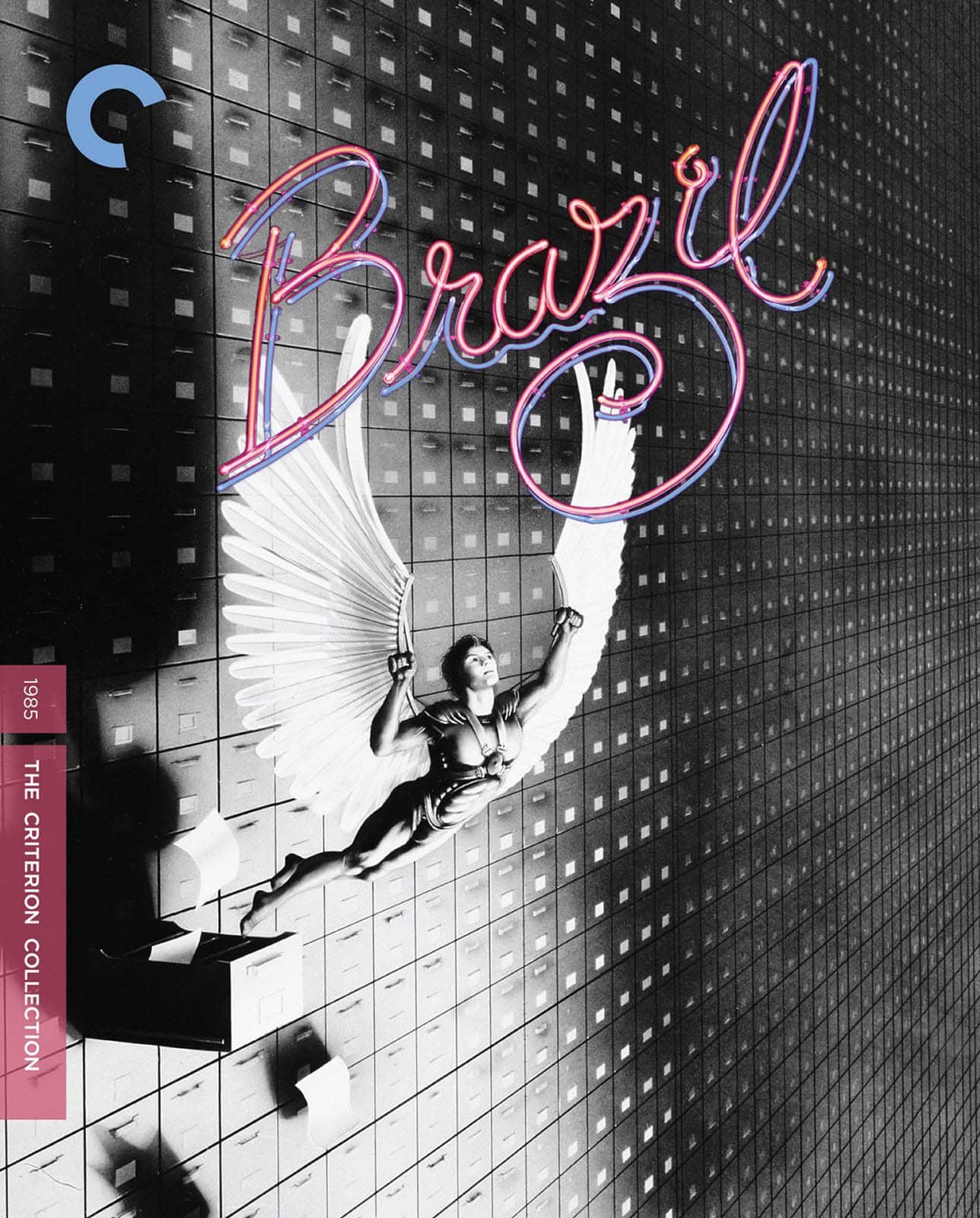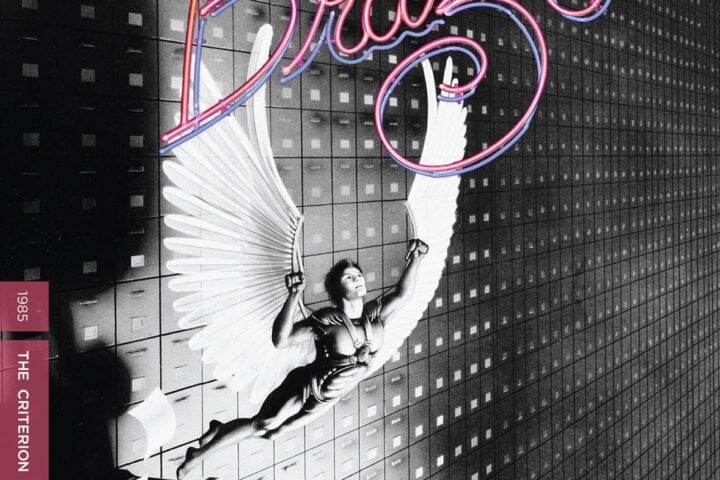 Through its wildly comic, furiously creative, and intensely moving facade, Terry Gilliam’s 1985 film Brazil ponders a future made to sustain a draconian past molded by inequality. In this dystopia, the rich, having long knelt at the altar of radical capitalistic tyranny, spend their days having their flesh stretched, sliced, and injected with ultraviolet potions, while the working class types, files, signs, and stamps its way through pointless paperwork.
Through its wildly comic, furiously creative, and intensely moving facade, Terry Gilliam’s 1985 film Brazil ponders a future made to sustain a draconian past molded by inequality. In this dystopia, the rich, having long knelt at the altar of radical capitalistic tyranny, spend their days having their flesh stretched, sliced, and injected with ultraviolet potions, while the working class types, files, signs, and stamps its way through pointless paperwork.
Overrun by communicative ducts, coated wires, cement and metals, and magnified, miniature computer screens, the future conjured up here averts the familiar prophecy of an anaesthetized, plastic world overrun by rampantly advancing technology. Indeed, men—who see such technology as an affront to their fiscal station and take the pecuniary gain of the morbid, perverse 1% as their modus operandi—unmistakably run the future of Gilliam’s film. New technology is expensive, and paper is cheap.
Sam Lowry (Jonathan Pryce) is in the thick of it, one of the litter of suited drones who’s also tasked with performing the day-to-day needs of his sniveling, inept boss, Mr. Kurtzmann (Ian Holm). The son of a grotesquely materialistic mother (Katherine Helmond), Sam is given to flights of fantasy wherein he’s a winged knight, soaring through the sky and saving an angelic beauty named Jill (Kim Greist) from a dour, cold industrial zone, to distract himself from the unwarranted nepotism that his mommy dearest insists on enacting.
Gilliam, working from a script he co-wrote with Tom Stoppard and Charles McKeown, presents Sam as tellingly unambitious and apolitical but lovesick, feverishly seeing the beauty from his fantasies in the open spaces of the cityscape’s massive, oppressive stone buildings. In reality, the beauty is Jill, a truck-driving courier who, in a chilling, darkly comic early sequence, witnesses her neighbor being violently taken away by the Ministry of Information (M.O.I.), where Sam is up for a promotion to the highly secretive Information Retrieval sector.
The film brilliantly uses the ineptitude of the M.O.I. outside of torture and killing as the inciting incidents that lead not only to Sam’s eventual rebellion against the system, but also the continued bombings perpetrated by Archibald Tuttle (Robert De Niro). It is, in fact, a clerical error, via a bored drone’s obsessive need to kill a pesky fly, which sends the M.O.I.’s militaristic security force after Jill’s neighbor, Mr. Buttle (Brian Miller), instead of Tuttle.
Tar-black in its comic tone, Brazil nevertheless rouses a wide range of robust emotions through its stunningly coherent, madly inventive narrative. Sam and Jill’s romance is hard-won, delicate, and strangely sweet, their culminating roll in the hay radiating pure joy, but the filmmakers also tap potently into the ruthless irresponsibility that a privatized bureaucracy engenders. After Mr. Buttle is executed by M.O.I., Sam pays a visit to his widow (Sheila Reid) to pass on a check, only to be met with a potent vision of violent grief and loss that wouldn’t be completely out of place in a depiction of the Irish Troubles. If Gilliam ultimately prefers the grotesque in his imagery, his predilections never limit the tremendous emotional experience that he imparts in Brazil.
Along with Sam, Jill, and Tuttle, Buttle’s widow cuts to the humanistic heart of Gilliam’s masterpiece, but there’s no mistaking the imprint of a Monty Python member. Physical and visual gags run through the film like those infernal ducts, and Gilliam makes great use of a brilliant supporting cast, from Bob Hoskins’s aggressive Central Services worker, to Jim Broadbent’s pompously kiss-ass plastic surgeon, to Michael Palin’s mild-mannered torturer-drone. The endless visual power of the film in all its Reed-Langian glory is matched by Gilliam’s unerring love for performers of untamed physical and verbal talents.
Besides the obvious Orwellian elements, the filmic pedigree of Brazil is richly layered, potently evoking the works of the Marx brothers and Kurosawa Akira, The Third Man, Battleship Potemkin, Star Wars, Casablanca, 8 ½, Modern Times, and, most vibrantly, Metropolis, among others. Such tremendous artists and films depicted the simultaneous joys and miseries of reality, as well as the enveloping power and ultimate intangibility of imagination and expression, and Brazil is a glorious ode to that essential dichotomy. Ironically anticipating his own rebellious fight against Universal, the heads of which wanted to relegate the film to a simple, 94-minute fantasy, Gilliam presents an utterly singular vision of a world where the cold, exacting actions of an all-powerful plutocracy are at once fighting against and employing fantasy, where the individual can be eaten alive and erased by pieces of paper.
Image/Sound
The new 4K restoration of Brazil has been sourced from the original 35mm camera negative, as well as an interpositive print, and the result is spectacular. It’s a real step up in terms of both clarity and depth compared to Criterion’s already handsome Blu-ray release from 2012. Colors are deep and resplendent, and black levels look totally uncrushed and free from any noisy fluctuations. The English Master Audio stereo mix sounds terrific, carrying the cleanly delivered dialogue, active ambient effects, and composer Michael Kamen’s rousing score.
Extras
Everything you ever wanted to know about Brazil but were unable to Google is afforded by these extras, all ported over from the 2012 Blu-ray, beginning with the commentary by Terry Gilliam on which he covers everything from the intricate, singular design of the film to its surplus of fascinating themes. (Gilliam’s discussion is nicely complemented by The Battle of Brazil, a fantastic hour-long account of the film’s troubled U.S. release, and Rob Hedden’s “What Is Brazil?,” an entertaining 30-minute look at the film’s production.) “The Production Notebook,” a collection of interviews and video essays, featuring a trove of Brazil-iana from Gilliam’s personal collection, covers almost everything else about the film you would want to know. Also included is the infamous “Love Conquers All” cut of the film, with optional commentary by Brazil expert David Morgan, a trailer, and a booklet featuring an essay by critic David Sterritt.
Overall
Criterion gives Terry Gilliam’s 1985 science-fiction black comedy Brazil an absolutely marvelous 4K makeover that really brings out the film’s visual panache.
Score:
Cast: Jonathan Pryce, Robert De Niro, Katherine Helmond, Ian Holm, Bob Hoskins, Michael Palin, Ian Richardson, Peter Vaughan, Kim Greist, Jim Broadbent, Barbara Hicks, Charles McKeown Director: Terry Gilliam Screenwriter: Terry Gilliam, Tom Stoppard, Charles McKeown Distributor: The Criterion Collection Running Time: 143 min Rating: R Year: 1985 Release Date: June 3, 2025 Buy: Video
If you can, please consider supporting Slant Magazine.
Since 2001, we’ve brought you uncompromising, candid takes on the world of film, music, television, video games, theater, and more. Independently owned and operated publications like Slant have been hit hard in recent years, but we’re committed to keeping our content free and accessible—meaning no paywalls or fees.
If you like what we do, please consider subscribing to our Patreon or making a donation.
